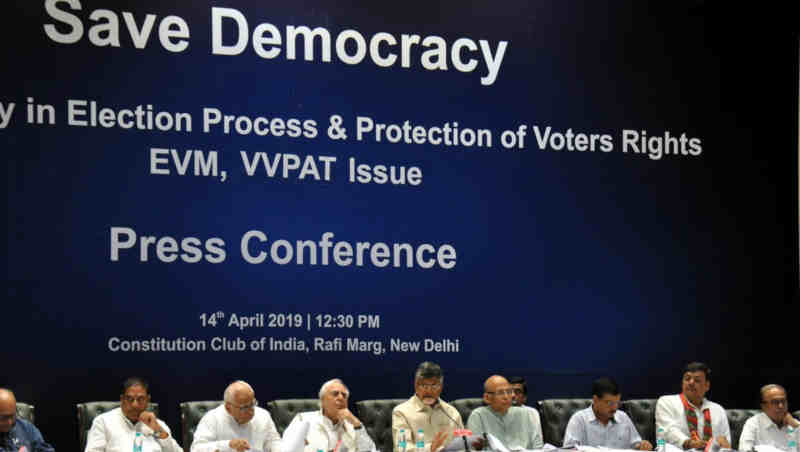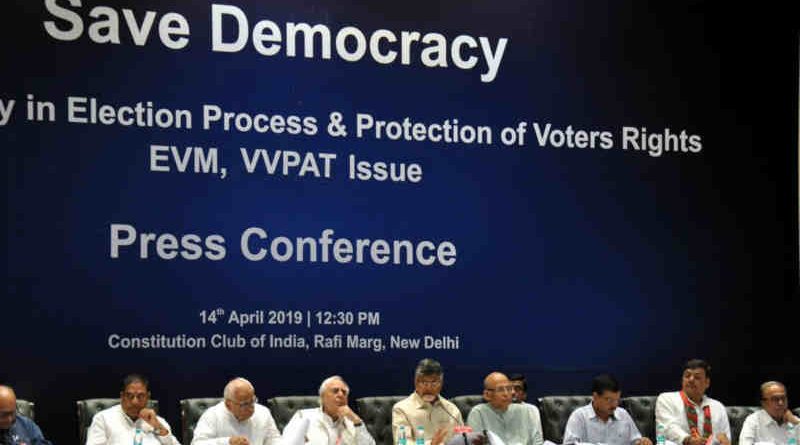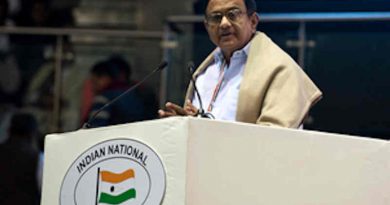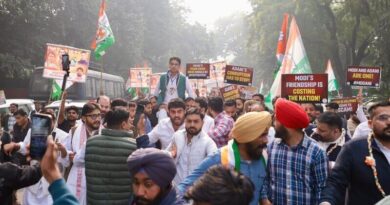Election Frauds: Rahul Gandhi Raises Doubts Over EVM Use in Elections

The opposition political parties in India keep complaining about the possibility of election frauds on EVMs, which can be manipulated to change the election results.
By Rakesh Raman
Rahul Gandhi – a leader of the dying opposition party Congress – has subtly raised question about the fairness of elections being held on electronic voting machines (EVMs).
Rahul Gandhi, who keeps sitting on Twitter to release vague tweets, tweeted in Hindi today that the democracy in India is under threat because the Bharatiya Janata Party (BJP) of Prime Minister (PM) Narendra Modi is colluding with the Election Commission of India (ECI) to win elections deceptively. He ended his tweet with the hashtag #EVMs.
EC की गाड़ी ख़राब,
भाजपा की नीयत ख़राब,
लोकतंत्र की हालत ख़राब!#EVMs— Rahul Gandhi (@RahulGandhi) April 2, 2021
“EC की गाड़ी ख़राब, भाजपा की नीयत ख़राब, लोकतंत्र की हालत ख़राब! #EVMs,” Rahul Gandhi tweeted today (April 2).
His reaction came when a video on social media purportedly showed an EVM being carried in the private vehicle of a sitting BJP MLA a few hours after the second phase of polling ended in Assam on April 1.
Now it is alleged that along with manipulating EVMs electronically, BJP also steals EVMs to replace them with those machines in which BJP has more votes. Rahul Gandhi’s sister and Congress leader Priyanka Gandhi raised this issue today (April 2).
Every time there is an election videos of private vehicles caught transporting EVM’s show up. Unsurprisingly they have the following things in common:
1. The vehicles usually belong to BJP candidates or their associates. ….
— Priyanka Gandhi Vadra (@priyankagandhi) April 2, 2021
“Every time there is an election video of private vehicles caught transporting EVMs show up, the vehicles usually belong to BJP candidates or their associates,” Ms. Gandhi tweeted along with the video. She added that the videos are taken as one off incidents and dismissed as aberrations and BJP uses its media machinery to accuse those who exposed the videos as sore losers.
“The fact is that too many such incidents are being reported and nothing is being done about them,” Ms. Gandhi said. “The ECI needs to start acting decisively on these complaints and a serious re-evaluation of the use of EVM’s needs to be carried out by all national parties.”
COMPLAINTS AGAINST EVMs
The opposition political parties in India keep complaining about the possibility of election frauds on EVMs, which can be manipulated to change the election results. But the ECI – which is completely controlled by the Modi government – ignores the opposition complaints and holds elections on EVMs and mostly BJP wins. And the defeated opposition parties including Congress willy-nilly accept the election results and wait for the next elections.
As elections are happening in different states (West Bengal, Tamil Nadu, Kerala, Assam, and Puducherry), the EVM issue has once again come to the center stage.
Sitaram Yechury, General Secretary of Communist Party of India (Marxist) – CPI(M) – has written a letter to the Chief Election Commissioner (CEC) about the malfunctioning of the EVMs and the Voter Verifiable Paper Audit Trail (VVPAT).
In his letter dated March 22, Yechury has complained about the misuse of EVMs in the 2019 Lok Sabha election that BJP won and the impact of the electoral bonds and role of money power in elections. He added that several petitions have been filed in the Supreme Court on both these issues, but they continue to remain pending in the court.
Yechury has quoted a recent report released by a civil society organization, Citizens’ Commission on Elections (CCE), on the faulty functioning of the EVMs and the VVPAT system, drawing evidence from several domain experts – including those on cyber security – who have raised legitimate questions.
The CPI(M) leader writes that the credibility of the conduct of elections in an electoral democracy is almost exclusively dependent on the implementation and the actions of the regulatory body, which is the ECI.
The Indian Constitution mandates and empowers the ECI with very wide powers under Article 324 to hold fair elections, but serious questions are being raised about the dubious role of the ECI in elections.
The letter adds that the credibility of the election process is based on transparency; and explanations provided by the ECI being verifiable. However, on both these counts, the response of the ECI – following the 2019 elections – has been far less than adequate.
“We, on behalf of the CPI(M), had written to you on several occasions to address these concerns which met with little or no response,” Yechury laments in his letter. He urged the CEC to address the major vulnerability in the conduct of the elections on EVMs and VVPATs.
But the CEC ignored Yechury complaint and election happened on EVMs. Rahul Gandhi and other opposition leaders complain about EVMs during all elections, but they prefer to lose the elections instead of boycotting the EVM elections under protest.
In a report released in January, the CCE had discussed the possibility of manipulations and the vulnerability of EVMs in Indian elections. Titled “Is the Indian EVM-VVPAT system fit for democratic elections,” the report highlighted the lack of transparency issue in EVMs and VVPAT.
Major opposition political parties in India have been repeatedly complaining about the vulnerability of EVMs, as they believe that Modi’s BJP tampers with EVMs to win elections fraudulently. Since most opposition politicians in India are weak and uneducated, they raise only feeble objections against the dubious election results. But finally they accept the results of EVMs, and Modi’s BJP keeps controlling the power.
DUBIOUS ROLE OF ELECTION COMMISSION
In order to check the possibility of election frauds on EVMs, recently Maharashtra government had decided to introduce ballot papers in state elections. It is also being observed that when EVMs malfunction, they vote only in favor of Modi’s BJP which runs with Lotus election symbol. Obviously, BJP will always oppose paper ballots and any investigation into the misuse of EVMs. And it goes without saying that the Election Commission – which is a toothless outfit – will always obey Modi.
However, top tech experts believe that it is very easy to tamper with EVMs in India and change the election results fraudulently in favor of certain candidates. In their study on EVMs in India, security researchers from India, the United States, and the Netherlands argue that “contrary to claims by Indian election authorities, these paperless electronic voting systems suffer from significant vulnerabilities.”
The researchers also have found that even brief access to the machines could allow dishonest election insiders or other criminals to alter election results. They have developed a video to demonstrate their claims.
Tech experts observe that besides other manipulations, the chip used in the EVMs is not of the OTP (One Time Programmable) category. That means, it can be programmed in each EVM to change the vote count in favor of a particular candidate.
WEAK OPPOSITION
The opposition parties in India have baselessly accepted EVMs integrated with Voter Verifiable Paper Audit Trail (VVPAT). But with this acceptance they have embarked upon a suicidal mission. They don’t understand that EVMs are vulnerable even with VVPAT.
Although VVPAT is supposed to provide a mechanism to audit the votes polled in an election, it is still not a foolproof solution because despite ECI’s claims VVPAT option may not be available with each EVM.
It is generally observed that the dishonest governments that control EVMs as well as the election authorities do not manipulate EVMs blatantly for the fear of being caught. They take the help of EVMs to change election results only in key polling stations where their candidates do not hope to win.
While there are repeated claims and counterclaims about the digital security of EVMs, the Indian government must invite independent international observers to supervise the functioning of EVMs in elections to ensure fairness in each election.
Also, the opposition parties must unite and demand all future elections on paper ballots. They must also demand the formation of a special all-party commission including international experts to probe the EVM-based voting frauds.
Earlier, the Association For Democratic Reforms (ADR) – a leading election research organization in India – had filed a petition in the Supreme Court regarding flaws in using EVMs in Indian elections.
The petition urged the court to direct the ECI to conduct actual and accurate reconciliation of (votes) data before the declaration of the final result of any election. It also appealed for an investigation into all such discrepancies in the data related to the 2019 Lok Sabha election results.
However, since courts and Election Commission work under the Modi government, they did not take any action to investigate the complaints against EVMs.
The opposition parties were vociferously opposing the use of EVMs before the election with allegations that BJP colludes with the ECI to tamper with the voting machines to win elections. But when the election results were declared in May 2019 and BJP won, all opposition parties went into a state of stony silence and did not challenge the results.
As the vulnerability of EVMs is clearly visible, it is believed that only those politicians and political parties will win future elections in India who know the art of stealing voter databases and hacking EVMs.
By Rakesh Raman, who is a national award-winning journalist and social activist. He is the founder of a humanitarian organization RMN Foundation which is working in diverse areas to help the disadvantaged and distressed people in the society.






